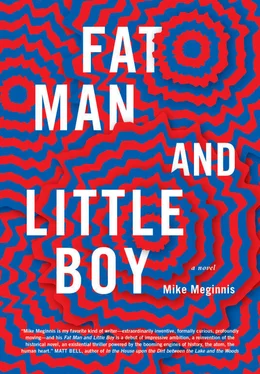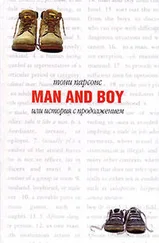He slides gore-slick through the hole, down the wall’s gentle slope, onto the warm floor and into the light, which is cast by some soft blue harsh-glowing crystal, like a heart become quartz. The walls of the cavern—massive, more an amphitheater—are thickly bejeweled with some million open hands, blue in the blue crystal’s light, with black palms made bruise-blue by selfsame light. They are here and there shelled with metal—black metal, silver metal—and it hangs from the ceiling, rotating slowly, reflecting the blue crystal’s light. Pieces of bomb shell. There, in the far wall, a large hole in the shape of a mouth. Through the hole, Fat Man’s face, speckled blue and red and yellow as if with some child’s paints.
On closer examination, the hole is not a hole but a cell. The cell is set low in the wall, its floor several feet beneath the floor. Little Boy kneels to better see inside. Though lined with small white teeth, the cell’s opening is barred by long arms, which extend from above and below, where lips should be, and clasp each other’s hands. Fat Man is pushing his face through the bars. He puts his arm out through another gap. He reaches for his brother. Little Boy reaches for his brother’s hand. There is no room for the fat man between the bars. Little Boy is looking for a weapon—a way to break the arms. He takes his brother’s hand. The skin is soft like putty.
“I’m here,” says Little Boy.
The skin hangs loosely from his brother’s arm like lichen. Little Boy perceives, beneath the skin, his brother’s bones. His knuckles, wrist, and elbow. Inside the cell, Fat Man is huddled. Though the skin remains, the fat is gone. His stomach skin hangs around his hips like a skirt. The skin of his legs pools at his feet. The fat is gone. The hollows of his face are deep and darkest blue. The hollow lines between his ribs. The dimples in his knees. Only the excess skin suggests what he has been.
Fat Man no more.
I wrote this book’s first draft as an MFA candidate at New Mexico State University. Tracy Rae Bowling and I were newly married when I started. She was and is my first reader; her love and support make my life and writing possible.
I owe the best parts of this book to my thesis workshop: Tracy, Erin Reardon, Daniel Cameron, Laura Walker, and Craig Holden, who led us.
Thank you to my other writing teachers at NMSU and Butler University: Evan Lavender-Smith, Mark Medoff, Dan Barden, Robert Stapleton, Susan Neville, and Patrick Clauss.
I first had the idea while researching an assignment for Sarah Hagelin’s class. That was lucky. Thank you, Dr. Hagelin.
Thank you to everyone who ever taught me anything, beginning with my mother. Thank you to my father and my brothers.
The characters of Masumi and Hideki owe a great deal to Emiko Ohnuki-Tierny’s Kamikaze Diaries: Reflections of Japanese Student Soldiers and Bernard Millot’s Divine Thunder: The Life and Death of Kamikazes. The portion set in France owes much of its tone and color to Rod Kedward’s France and the French . Horst Rosenthal wrote and drew the Mickey Mouse comic described in “Cathedral.” Roxane Gay and Kyle Minor helped me with several little bits of French. Charlie Tangora gave me the Japanese characters for “remains,” which was another very lucky thing.
If this book seems polished, professional, or concise, it has everything to do with the efforts of my editor, Buzz Poole, and my copy editor, Lori Shine, who makes the trains run on time. Thank you to them and to the Black Balloon team, including Janna Rademacher, David Bukszpan, Jennifer Abel Kovitz, Arvind Dilawar, Barbara Cleveland Bourland, and those I don’t yet know.
Thank you Matt Bell, Patrick deWitt, Robert Lopez, Lindsay Hunter, Blake Butler, Amber Sparks, and again Evan Lavender-Smith, for your good hearts and kind words.
Finally, thank you to the community of readers and writers that has made me feel welcome and wanted over the past five years. If you are reading this now, then you’re part of that community, and I’m so glad.
Mike Meginnis has published stories in Best American Short Stories 2012, The Collagist, PANK, and many other venues. He contributes regularly to HTML Giant and Kill Screen . Meginnis earned his MFA at New Mexico State University, where he served as the managing editor of Puerto del Sol . Currently, he operates Uncanny Valley Press with his wife, Tracy Rae Bowling. Meginnis lives and works in Iowa City.
Horatio Nelson Fiction Prize

Fat Man and Little Boy is the inaugural recipient of The Horatio Nelson Fiction Prize, an annual award given to a previously-completed manuscript that comes with $5,000 and a Black Balloon Publishing book deal.
This contest has no reading fee and is open to anyone who has previously completed an unpublished original work of fiction of over 50,000 words.
We dedicate this prize to Admiral Lord Horatio Nelson, a man who defied convention at every turn. A one-eyed, one armed lunatic genius who never gave up, he began his military career fully intact, but eventually lost his right eye (Corsica, 1793) and his right arm (the Canary Islands, 1797) in battle. He refused to wear an eye patch over the wound and used it to deliberately ignore a direct order from a superior officer during the Battle of Copenhagen in 1801, coining the phrase “turning a blind eye.” When egomaniac and noted short stack Napoleon attempted to use our beloved balloons for evil during the 1798 Battle of Aboukir with a “military balloon corps,” Nelson immediately destroyed the approaching objects, putting a permanent stop to the short-lived European militarization of these symbols of wonder. Our hero.
Like Nelson, we believe in relentless creativity and perseverance against all odds.
Are you the next literary Horatio Nelson we’re looking for?
Check blackballoonpublishing.comfor your chance to enter.
Praise for Mike Meginnis’ Fat Man and Little Boy
“In his inventive and fabulist debut novel Fat Man and Little Boy Mike Meginnis lends a surprisingly human dimension to the atomic bombs dropped on Japan during World War II.”
—
Largehearted Boy
“Beguiling, strange, and strangely lovely, Fat Man and Little Boy is a deeply sorrowful yet mysteriously empowering debut.”
—Patrick deWitt, author of
The Sisters Brothers
“Only someone with the deftness of heart of a writer like Mike Meginnis could redefine the war novel into something like Fat Man and Little Boy , a book which translates our basic world of never-ending terror into a highly nuanced and inventive diorama available absolutely nowhere else.”
—Blake Butler, author of
Scorch Atlas and
There is No Year
“Mike Meginnis is my favorite kind of writer—extraordinarily inventive, formally curious, profoundly moving—and his Fat Man and Little Boy is a debut of impressive ambition, a reinvention of the historical novel, an existential thriller powered by the booming engines of history, the atom, the human heart.”
—Matt Bell, author of
In the House upon the Dirt between the Lake and the Woods
“In Fat Man and Little Boy , Mike Meginnis takes the mother of all atrocities and makes it strange, sizable, turns it so sideways that we're forced to notice, to take heed. This alone is an achievement, but it's the way he does it that dazzles—with gorgeous, careful prose that gives us human failings and a desperate longing for connection so vividly rendered that we have no choice but drink it in, to reckon once again with this disaster in our own time and way.”
Читать дальше













